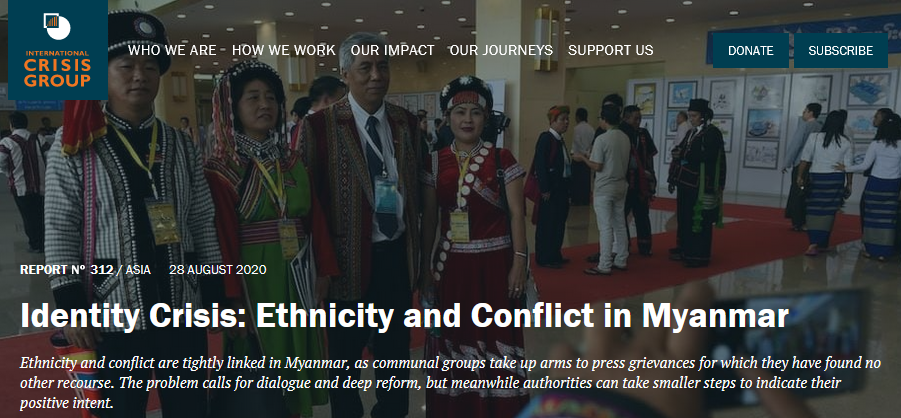
Harun Nasrullah
In its report, Identity Crisis: Ethnicity and Conflict in Myanmar the International Crisis Group, said ethnicity and conflict are inextricably linked in Myanmar, creating a vicious cycle of violence that continues to escalate
‘The state’s inability to address ethnic minority grievances or provide adequate security to communities has created a literal arms race among minority groups,’ said the report released on August 28 to mark the third anniversary of the 2017 crackdown that heralded the start of the genocide of Rohingya Muslims by the Myanmar army.
It said Myanmar must initiate reforms in ‘citizenship, the country’s administrative structure and the peace process with the aim of making ethnicity less central to the political and legal domains.’
The Brussels-based organization urged Myanmar authorities and leaders to immediately pursue more manageable changes ‘such as the language and narratives they use when discussing ethnicity and conflict.’
The report underlined that Myanmar, since its independence in 1948, has struggled to forge a national identity reflecting its ethnic diversity.
The country’s leaders have perpetuated dangerous notions of ethnic identity that divide rather than unify its national races, read the report.
‘Ethnic minority grievances toward the state have perpetuated some of the world’s longest-running armed conflicts,’ said the report. Highlighting that the country’s Burman elite continue to control most levers of power, the report said Myanmar’s leaders have done little to address ‘minority grievances or build a more inclusive national identity.’
It said the Government’s failure to protect minority communities has led “tens of thousands of people to take up arms – both for and against the state, and both allied with or acting against armed groups representing rival ethnicities.”
‘Ethno-nationalism is at the core of all these groups, a characteristic that often sets them against their neighbours,’ the report added.
On the ongoing violence against minority groups in the state of Rakhine by the Myanmar military, the report said ‘the vicious fighting … since 2018 underlines the dangers of ethnicity’s growing social and political salience.’
‘Non-Rakhine minorities in Rakhine State have found themselves caught between two warring groups, neither of which they can rely on for protection,’ it said.
‘The insecurity that such conflicts generate only encourages the creation of ever more armed groups, a phenomenon that has recurred over and over in Myanmar’s modern history.’ Acknowledging that ‘charting a more tolerant and inclusive future for the country will not be easy,’ the ICG said one of the first steps was that ‘communities must be free to celebrate their ethnic heritage, culture and identity.’
However, it said that citizenship and protection should not be based on membership in particular ethnic categories. Described by the UN as “the world’s most persecuted people” the Rohingya are Myanmar’s most targeted community.
In its report to the UN Human Rights Council for Myanmar’s Universal Periodic Review submitted on July 20, Human Rights Watch said that, ‘The Government has disregarded its international legal obligations to provide accountability for Myanmar military atrocities. It has refused to cooperate with the Human Rights Council-established Fact-finding Mission to investigate atrocity crimes and barred the previous UN special rapporteur on human rights in Myanmar from entering the country.’
The Government failed to revoke or amend rights-abusing laws that undermine the rights to freedom of expression, association, and peaceful assembly. As a result, hundreds of human rights defenders, community leaders, trade union members and leaders, and other civil society activists, have faced prosecution and imprisonment for exercising their basic rights. Focusing on the Rohingya population, Amnesty
International’s Southeast Asia Regional Director, Nicholas Bequelin, told The Muslim News, “Nothing has changed for the estimated 600,000 Rohingya who live in Rakhine State in dire conditions, including around 126,000 whom the authorities are holding indefinitely in camps.”
He said they are still “denied their rights to nationality, freedom of movement and access to services – including healthcare,” and that they are also, “caught in an escalating armed conflict between the Myanmar military and the Arakan Army.”
He continues, “Internet blackouts have kept the Rohingya and other minorities in Rakhine and Chin States deprived of potentially life-saving information and impeded monitoring of the humanitarian situation on the ground.
Until there is genuine accountability for those responsible for crimes under international law, there is little hope for improvement in the lives of the Rohingya and other ethnic minorities.”